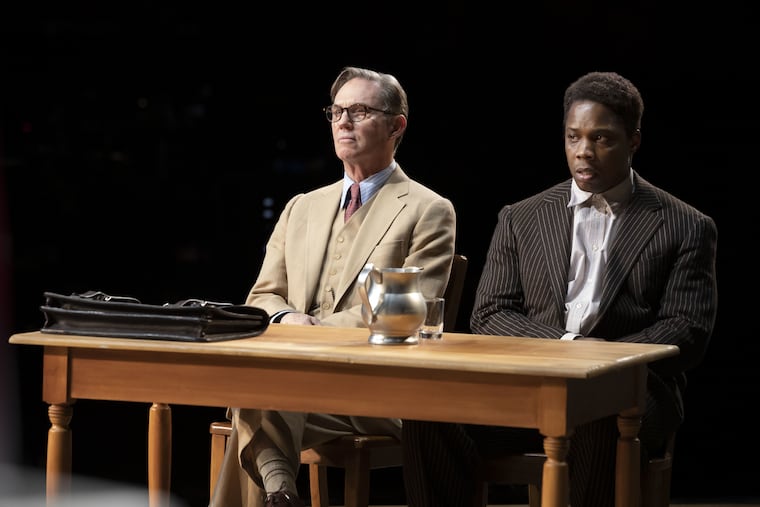The Kimmel’s ‘To Kill a Mockingbird’ is contemporary, powerful, sometimes heavy-handed
In Aaron Sorkin's stage adaptation, Richard Thomas’ Atticus Finch, the lawyer assigned to defend a Black man in a rape case in the 1930s South, must also take stock of his white entitlement.

Revisiting the gorgeously wrought, understated 1962 screen adaptation of Harper Lee’s To Kill a Mockingbird on the eve of seeing, for the first time, Aaron Sorkin’s contemporary stage version may have been an error. It highlighted just how unsubtle Sorkin can be.
To be clear: The national touring production, presented by the Kimmel Cultural Campus in partnership with The Shubert Organization, is almost always involving. It is smartly paced by director Bartlett Sher and well-acted by an ensemble led by Richard Thomas (The Waltons, Ozark), reprising Jeff Daniels’ Broadway role.
But the messaging can be heavy-handed. The denouement runs too long. And the protagonist, the lawyer Atticus Finch — whose portrayal by Sorkin was the subject of a legal battle with Lee’s estate — seems incoherent.
The bestselling, Pulitzer Prize-winning 1960 novel is a meditation on race relations, the dangers of stereotyping, justice gone awry, and innocence lost in the Depression-era South. It’s narrated by an older version of Jean Louise “Scout” Finch, Lee’s avatar, though mostly from a child’s perspective.
Scout’s father, Atticus, has been assigned the promethean task of defending a Black man charged with raping a white woman before an all-white jury. (In this production, Yaegel T. Welch lends the role of Tom Robinson immense dignity.) There are gothic elements, too, in the mysterious character of Boo Radley, unseen at first, and then revealed — like so much else in Lee’s fictionalized Alabama hometown — to be not what he seems.
» READ MORE: Richard Thomas stars in ‘To Kill a Mockingbird’ in Philly. He talks about the play and his career.
Sorkin offers a deconstructed Mockingbird, rethinking its characters and themes for a 21st-century audience attuned to ongoing racial injustice. Against an industrial backdrop, designer Miriam Buether smoothly transforms the Kimmel’s Academy of Music stage into a courtroom, the Finch porch, and other settings. But we miss the spookiness of the forest where one of the story’s climactic confrontations takes place.
One plus is the addition of considerable sly humor. At the same time, Sorkin has amped up the moral fervor, turning it even on Atticus himself, who must be schooled by the Finches’ Black housekeeper, Calpurnia. It’s smart to give Calpurnia (Jacqueline Williams, commanding and world-weary) a voice (make that a bullhorn) and Atticus a character arc — even if it doesn’t entirely gel.
Here Atticus’ signature exhortation to try to see the world from others’ point of view becomes a flaw. He’s criticized (by his children, among others) for being too tolerant and meek. In the novel, Scout observes: “I never heard Atticus raise his voice in his life.” Yet Thomas’ Atticus is prone to passionate, thundering outbursts in the courtroom: not meek at all.
In Sorkin’s Mockingbird, Calpurnia improbably chides her employer for his arrogance, and indeed this Atticus, unlike Lee’s, is certain he’ll win his case. But the trigger of what Atticus anachronistically calls her “passive aggression” is a specific verbal offense that seems to epitomize white entitlement. He’s failed in this instance to see the world as she does.
In structural terms, Sorkin’s storytelling is often clever: The narrative zigzags in time, with courtroom scenes threaded chronologically throughout. The adult Scout (Melanie Moore) now shares narrative duties with her older brother, Jem (Justin Mark), and playmate Dill (Steven Lee Johnson, affecting and funny as a version of Lee’s childhood friend Truman Capote).
Picking out the contemporary parallels are easy to spot. The villainous Bob Ewell (a wonderfully slithery Joey Collins) doubles as a “deplorable,” displacing his own economic misery into racial animus. The lynch mob, some in Klan hoods, evokes our costumed, conspiracy-embracing right-wing militias. And one tragic murder is a jolting reminder of the many unjustified police slayings to come.
Finally, there’s a piece of stunt casting to savor: Mary Badham, whose film performance as Scout gained an Oscar nomination, turns up as the crotchety Mrs. Henry Dubose, another character — like the incorrigible Ewell — who may be unworthy of redemption.
To Kill a Mockingbird is presented by the Kimmel Cultural Campus, in partnership with The Shubert Organization, at the Kimmel’s Academy of Music, 250 S. Broad St., through July 24. Tickets: $20-$139 Information: www.kimmelcuturalcampus.org or 215-893-1999.